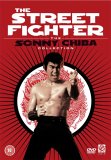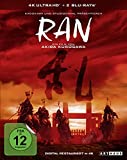 Street Fighter: Assassin's Fist Blu-ray Steelbook | Blu Ray | (27/10/2014)
from £17.99
| Saving you £12.00 (66.70%)
| RRP
Street Fighter: Assassin's Fist Blu-ray Steelbook | Blu Ray | (27/10/2014)
from £17.99
| Saving you £12.00 (66.70%)
| RRP Limited Edition Steelbook. Includes Art Cards. If a man alters his path can he change his destiny...or only delay the inevitable? Based on one of the most recognised and beloved video game franchises in the world 'Street Fighter: Assassin's Fist' is the live-action origin story of iconic characters Ryu and Ken as they live a traditional warrior's life in secluded Japan. Unknowingly the boys are the last practitioners of the ancient fighting style known as 'Ansatsuken' (Assassin's Fist). During their time together they learn about the mysterious past of their master Goken and the dark tragic legacy of the Ansatsuken style. Can their destiny be changed or will history repeat itself? Delivering top-notch martial arts action and stunning visual effects this is a must-see for all Street Fighter fans and action cinema lovers alike. Special Features: Main Trailer Director Commentary with Joey Ansah Ken’s Video Diary The Making Of… Extra Scenes and Outtakes Trailers
 The Go Master | DVD | (06/10/2008)
from £N/A
| Saving you £N/A (N/A%)
| RRP
The Go Master | DVD | (06/10/2008)
from £N/A
| Saving you £N/A (N/A%)
| RRP A Chinese man becomes an expert player of the traditional game of Go.
![Princess Principal Collection BLU-RAY Standard Edition [2019]](/pictures/1149596.jpg) Princess Principal Collection BLU-RAY Standard Edition | Blu Ray | (10/06/2019)
from £31.98
| Saving you £N/A (N/A%)
| RRP
Princess Principal Collection BLU-RAY Standard Edition | Blu Ray | (10/06/2019)
from £31.98
| Saving you £N/A (N/A%)
| RRP NOTICE: Polish Release, cover may contain Polish text/markings. The disk has English audio.
 Pride 11 And 12 | DVD | (17/07/2006)
from £5.40
| Saving you £3.59 (66.48%)
| RRP
Pride 11 And 12 | DVD | (17/07/2006)
from £5.40
| Saving you £3.59 (66.48%)
| RRP Pride 11 - Bout List: 1. Kazushi Sakuraba vs. Shannon Ritch 2. Naoya Ogawa vs. Masaaki Satake 3. Igor Vovchanchyn vs. Nobuhiko Takada 4. Akira Shoji vs. Herman Renting 5. Alexander Otsuka vs. Mike Bourke 6. Gary Goodridge vs. Yoshiaki Yatsu 7. Wanderlei Silva vs. Gilbert Yvel 8. Heath Herring vs. Tom Erikson Pride 12 - Bout List: 1. Kazushi Sakuraba vs. Ryan Gracie 2. Igor Vovchanchyn vs. Mark Kerr 3. Ricco Rodriguez vs. John Marsh 4 Kazuyuki Fujita vs. Gilbert Yvel 5. Wanderlei Silva vs. Dan Henderson 6. Carlos Newton vs. Johil de Oliveira 7. Heath Herring vs. Enson Inoue 8. Ricardo Almeida vs. Akira Shoji 9. Guy Mezger vs. Alexander Otsuka Special Features PRIDE FC Rules Fight Glossary Photo Gallery
 The Streetfighter | DVD | (24/01/2005)
from £N/A
| Saving you £N/A (N/A%)
| RRP
The Streetfighter | DVD | (24/01/2005)
from £N/A
| Saving you £N/A (N/A%)
| RRP A mercenary kung fu fighter is hired by both Yakuza and Mafia as they plot to kidnap the daughter of an oil magnate. However when each gang refuses to meet his asking price the master switches sides and is hired to protect the woman at all costs... Excellent martial arts action from the first in the series of 'Streetfighter' movies that made Sonny Chiba lately referencing his own reputation with a cameo in Quentin Tarantino's 'Kill Bill' an international star.
 Pride 7 And 8 | DVD | (03/04/2006)
from £12.13
| Saving you £-3.14 (-34.90%)
| RRP
Pride 7 And 8 | DVD | (03/04/2006)
from £12.13
| Saving you £-3.14 (-34.90%)
| RRP More high octane jaw breaking back-slamming action from the world of the Pride Fighting Championships. Pride 7 - Bout List: Mark Kerr v Igor Vovchanchyn Kazushi Sakuraba v Anthony Macias Akira Shoji v Larry Parker Branko Cikatic v Maurice Smith Enson Inoue v Tully Kulihaapai Carl Malenko v Wanderlei Silva Daijiro Matsui v Bob Schrijber Pride 8 - Bout List: Kazushi Sakuraba v Royler Gracie Alexander Otsuka v Renzo Gracie Igor Vovchanchyn v Francisco Bueno Gary Goodridge v Tom Erikson Mark Coleman v Ricardo Morais Carl Malenko v Allen Goes Frank Trigg v Fabiano Iha Daijiro Matsui v Wanderlei Silva
![Slayers Revolution: Season 4 Pt. 1 [DVD]](/pictures/1103503.jpg) Slayers Revolution: Season 4 Pt. 1 | DVD | (08/11/2010)
from £33.73
| Saving you £-8.74 (N/A%)
| RRP
Slayers Revolution: Season 4 Pt. 1 | DVD | (08/11/2010)
from £33.73
| Saving you £-8.74 (N/A%)
| RRP Slayers Revolution: Season 4 Part 1 (2 Discs)
![City Of Lost Souls [2000]](/pictures/1005976.jpg) City Of Lost Souls | DVD | (18/11/2002)
from £11.78
| Saving you £3.21 (27.25%)
| RRP
City Of Lost Souls | DVD | (18/11/2002)
from £11.78
| Saving you £3.21 (27.25%)
| RRP A stylised and violent thriller, prolific director Miike Takashi's The City Of Lost Souls (2000) is set in the ganglands of Tokyo and pays homage to Sergio Leone, Quentin Tarantino and, in a daft, animated cockfighting sequence, The Matrix. Mario (Teah) is the Japanese-Brazilian gunslinger fresh out jail who, in a hilariously audacious action sequence, hijacks a helicopter to save his Chinese girlfriend Kei (Michelle Reis) from deportation. He must then secure 18 million yen to secure fake passports for both of them to make a new life for themselves in Australia. In a misconceived operation, Mario arrives at the lair of the intriguing Ko, Kei's ex-boyfriend--a self-assured, effeminate young exchange student--who is somehow head of a vicious gang of Triads. He is on the point of buying a consignment of cocaine from decadent, cold-blooded Yakuza gangster Fushimi when Mario's arrival triggers a shootout, with Mario escaping with the wrong suitcase. Now, in time-honoured True Romancefashion, Mario and Kei are on the run from the mob. Although visually tricksy with some strong set-pieces, The City of Lost Souls is rather hazy when it comes to story and characterisation. We get little sense of the runaway couple as people. A young blind girl is introduced into the tale and there are romantic moments between Mario and Kei but these feel like sugary palliatives to the bloodshed rather than touching moments. Better perhaps to check out Takashi's Audition, a brilliantly gruesome satire on male Japanese attitudes towards womanhood. This is a flashier, faster but less artistically satisfying affair. On the DVD: The City of Lost Souls is presented in video aspect ratio 1.85:1, with reasonable clarity and sharpness. However, the English subtitles are a little pidgin and slapdash in places, none of which improves the main special feature, a rather dull and vague interview with director Takashi. --David Stubbs
![The Life Of Oharu [1952]](/pictures/1011920.jpg) The Life Of Oharu | DVD | (26/04/2004)
from £N/A
| Saving you £N/A (N/A%)
| RRP
The Life Of Oharu | DVD | (26/04/2004)
from £N/A
| Saving you £N/A (N/A%)
| RRP Mizoguchi reckoned The Life of Oharu was his masterpiece, and who are we to disagree? Certainly it's among his most perfectly structured films, in which anger at the treatment of women in Japanese society is balanced by the director's flawless sense of period, and by expert pacing and visual composition. The story is set in the 17th century, when Japan had settled into a rigidly hierarchical society. Kinuyo Tanaka, in perhaps the finest role of her career, plays Oharu, a highborn woman of the Imperial court. Disgraced when she falls in love with a man of a lower class (Toshiro Mifune, in his only film for Mizoguchi), she's made the mistress of a feudal lord. After bearing him a son she's cast out, and gradually sinks into prostitution and penury. The inevitability of Oharu's fate is tempered by her resilience of spirit--and by the compassion of Mizoguchi's gaze. Although the story is set in the past, he fully intends parallels with modern-day Japan; just after completing the film, he told an interviewer, "Comparing today with [earlier] periods, I don't find much difference: women have always been treated like slaves." The Life of Oharu was shown at the 1952 Venice Festival, where it was awarded the Golden Lion. It brought Mizoguchi a belated international fame just four years before his death, and initiated the run of late masterpieces that rounded off his career. --Philip Kemp
![Criterion Collection: Yojimbo [Blu-ray] [1961] [US Import]](/pictures/1155608.jpg) Criterion Collection: Yojimbo | Blu Ray | (23/03/2010)
from £N/A
| Saving you £N/A (N/A%)
| RRP
Criterion Collection: Yojimbo | Blu Ray | (23/03/2010)
from £N/A
| Saving you £N/A (N/A%)
| RRP ![Nura - Rise Of The Yokai Clan: Season 2 - Part 1 [DVD]](/pictures/1125542.jpg) Nura - Rise Of The Yokai Clan: Season 2 - Part 1 | DVD | (10/03/2014)
from £N/A
| Saving you £N/A (N/A%)
| RRP
Nura - Rise Of The Yokai Clan: Season 2 - Part 1 | DVD | (10/03/2014)
from £N/A
| Saving you £N/A (N/A%)
| RRP Rikuo Nura lives in Ukiyoe Town and looks like your typical junior high student. But unlike his classmates he lives in an old Japanese-style house full of yokai that serve him. Unbeknownst to many Rikuo is the grandson of Nurarihyon who is the leader of all yokai. Rikuo is regarded as the Third Heir of the Nura Clan but he has yet to officially take his seat.
![Nura - Rise Of The Yokai Clan: Season 2 - Part 2 [DVD]](/pictures/1127761.jpg) Nura - Rise Of The Yokai Clan: Season 2 - Part 2 | DVD | (07/07/2014)
from £16.49
| Saving you £13.50 (45.00%)
| RRP
Nura - Rise Of The Yokai Clan: Season 2 - Part 2 | DVD | (07/07/2014)
from £16.49
| Saving you £13.50 (45.00%)
| RRP The Nura Clan faces a new threat: the 88 Demons of Shikoku, led by Inugamigyobu-Tanuki Tamazuki! Tamazuki sets his plan in motion to weaken the Nura Clan by targeting their key source of power-the local deities of Ukiyoe Town. In the absence of Supreme Commander Nurarihyon, Rikuo's resolve to become the Third Heir is put to the test, as he must unite the clan to face Tamazuki and his malicious weapon the Devil's Blade!
![Starfish Hotel [2006]](/pictures/1087234.jpg) Starfish Hotel | DVD | (27/10/2008)
from £13.15
| Saving you £-6.16 (N/A%)
| RRP
Starfish Hotel | DVD | (27/10/2008)
from £13.15
| Saving you £-6.16 (N/A%)
| RRP Strange things always happen in Jo Kuroda's mystery novels. There is always a sinister rabbit called Mr Trickster; and someone always ends up dead. A man's wife disappears and he finds her working in a brothel deep in the heart of the city. There is a universe called the Darkland that can only be entered through a hidden tunnel. There is a young girl that the man had an affair with in the dead of winter two years ago. She would only meet him in the eerie crumbling Starfish Hotel. Now she's disappeared too. If you meet Jo Kuroda one night don't tell him your dreams.
![The Flowers And the Angry Waves [1964]](/pictures/1054043.jpg) The Flowers And the Angry Waves | DVD | (26/03/2007)
from £19.75
| Saving you £0.24 (1.22%)
| RRP
The Flowers And the Angry Waves | DVD | (26/03/2007)
from £19.75
| Saving you £0.24 (1.22%)
| RRP In early 20-century industrial Japan Yakuza member Kikuju flees to Tokyo with his master's proposed bride leaving more than a few corpses in his wake. Settling down to work with some corrupt building contractors Kikuju is unaware that an assassin from his old gang is in town looking for him... Seijun Suzuki's blistering run of off-the-wall subverted genre movies continued with this scathing look at the stand-off between Japanese big business and no less corrupt trade unions while throwing in some stunning cinematography characteristic camera moves and of course a tattoed bandit geisha femme fatale!
![Madadayo [1993]](/pictures/1075943.jpg) Madadayo | DVD | (24/09/2007)
from £8.05
| Saving you £11.94 (148.32%)
| RRP
Madadayo | DVD | (24/09/2007)
from £8.05
| Saving you £11.94 (148.32%)
| RRP The main story of the film is based on the life of a Japanese academic and author Hyakken Uchida (1889-1971). The film opens with him resigning as a professor of German in the period immediately before the Second World War. The plot of the film is centered around his relationship with his former students who care for him in his old age. The title 'Not Yet' in English is an allusion to an ancient Japanese legend mentioned in one scene of the film of an old man who refuses to die. This story is constantly referred to in the movie as every year on the professor's birthday his students throw him a party in which they all ask him ""Mada kai?"" (""Are you ready?""). He responds by drinking a large ceremonial glass of beer and shouting ""Mada dayo!"" (""Not yet!"") implying that death may be near but life still goes on!
![Nura - Rise Of The Yokai Clan: Season 1 - Part 2 [DVD]](/pictures/1122887.jpg) Nura - Rise Of The Yokai Clan: Season 1 - Part 2 | DVD | (02/09/2013)
from £N/A
| Saving you £N/A (N/A%)
| RRP
Nura - Rise Of The Yokai Clan: Season 1 - Part 2 | DVD | (02/09/2013)
from £N/A
| Saving you £N/A (N/A%)
| RRP Second volume of episodes from the anime following the adventures of a boy who is part-human, part-demon. Rikou Nura (voice of Jun Fukuyama) lives in a house of spirits with his grandfather Nurarihyon (Chikao Otsuka), who also leads the demonic clan Nura Youkai. Rikou is due to succeed his grandfather as clan head but recoils from his demonic side and determines to do good deeds in order to become more human. However, will the power his demonic capacities afford him eventually lure him along ...
 Ran / Special Edition (4K Ultra HD + 2 Blu-rays) | Blu Ray | (15/07/2021)
from £N/A
| Saving you £N/A (N/A%)
| RRP
Ran / Special Edition (4K Ultra HD + 2 Blu-rays) | Blu Ray | (15/07/2021)
from £N/A
| Saving you £N/A (N/A%)
| RRP ![Ran [Blu-ray]](/pictures/1103881.jpg) Ran | Blu Ray | (18/10/2010)
from £N/A
| Saving you £N/A (N/A%)
| RRP
Ran | Blu Ray | (18/10/2010)
from £N/A
| Saving you £N/A (N/A%)
| RRP Akira Kurosawa's brilliantly conceived retelling of Shakespeare's 'King Lear' magically mixes Japanese history Shakespeare's plot and Kurosawa's own feelings about loyalty in this epic masterpiece. Set in 16th century Japan an aging ruler Lord Hidetora (Tatsuya Nakadai) announces his intention to divide his land equally among his three sons. This decision to step down unleashes a power struggle between the three when Hidetora falls prey to the false flattery bestowed upon him by the two older sons and banishes the youngest when he speaks the truth. The ruthless betrayal ultimately drives Hidetora insane destroying his entire family and kingdom. Deep human emotion and outstanding acting combine to create one of the most acclaimed foreign films of all time.
![Branded To Kill [1967]](/pictures/1003503.jpg) Branded To Kill | DVD | (25/02/2002)
from £20.00
| Saving you £-0.01 (N/A%)
| RRP
Branded To Kill | DVD | (25/02/2002)
from £20.00
| Saving you £-0.01 (N/A%)
| RRP Seijun Suzuki's absolutely mad yakuza movie Branded to Kill bends the hit-man genre so out-of-shape it more resembles a Luis Bunuel take on Martin Scorsese. Number Three killer Goro Hanada (Jo Shishido) is a hired gun who loves his work, but when he misses a target after a mere butterfly sets his carefully balanced aim astray, he becomes the next target of the mob. Goro is no pushover and easily dispatches the first comers, leaving them splayed in death contortions that could qualify for an Olympic event, but the rat-a-tat violence gives way to a surreal, sadistic game of cat and mouse. The legendary Number One mercilessly taunts his target before moving in with him in a macho, testosterone-laden Odd Couple truce that ends up with them handcuffed together. Kinky? Not compared to earlier scenes. The smell of boiling rice sets Goro's libido for his mistress so aflame that Suzuki censors the gymnastic sex with animated black bars that come to life in an animated cha-cha. Because Suzuki pushed his yakuza parodies and cinematic surrealism too far, his studio, Nikkatsu, finally called in their own metaphoric hit and fired the director with such force that he was effectively blackballed from the industry for a decade. It took about that long for audiences to embrace his audacious genre bending--Suzuki's pop-art sensibilities were just a bit ahead of their time. --Sean Axmaker, Amazon.com
![Naruto Shippuden - Box Set 8 [DVD]](/pictures/1113064.jpg) Naruto Shippuden - Box Set 8 | DVD | (27/02/2012)
from £N/A
| Saving you £N/A (N/A%)
| RRP
Naruto Shippuden - Box Set 8 | DVD | (27/02/2012)
from £N/A
| Saving you £N/A (N/A%)
| RRP In the village Hidden in the Leaves, ninja reign supreme, and school is literally a battlefield. Naruto, Sasuke and Sakura are teenage classmates and ninja in training, working together -sort of! - under the instruction of their teacher, Kakashi. Sasuke is training to win revenge...Sakura is training to win Sasuke...And Naruto, the class clown, insists that he ll become the greatest ninja in the land!

Please wait. Loading...
This site uses cookies.
More details in our privacy policy